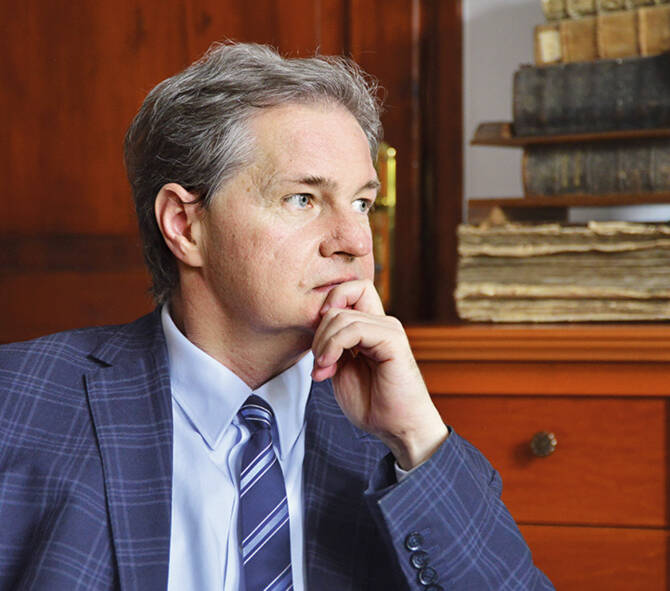Interview with András Kosztur, historian and lead researcher for the XXI. Század Intézet (“XXIst century institute”), on the recent debates around the Eastward opening policy of the Hungarian government: “It’s not in Hungary’s interest to partake in Cold War hysterics”.
András Kosztur is a political researcher at the XXIst Century Institute in Budapest, a political research institute close to the Hungarian government and well known for its numerous publications, polls and conferences covering various social and current political topics. Hungarian analyst from Ukraine, András Kosztur, is specialised in the study of post-soviet countries and is closely following the Eastern opening policy.
Yann Caspar asked him about the Hungarian policy regarding Eastern partners – mainly Russia and China – and also about Hungary’s position in a world of bloc politics.
—
Yann Caspar: One of China’s elite universities, Fudan University, plans to open its first European campus in Hungary in 2024; the Chinese President Xi Jinping highlighted and welcomed this initiative. While the Hungarian opposition assumes the project carries a threat to national security, the government says this project could be one of the fruits of the successful “Eastern Opening Policy”. What do you think, why is Hungary the first chosen destination for such an institution within the European Union?
András Kosztur: If we observe the Central European region, it is visible that other countries also don’t reject economic relations with Eastern powers, but they try to keep distance from projects which could be characterized with symbolic or geopolitical content. Many leaders from the region follow the traditional anti-Russian approach, partly because of conformism and they slavishly seek to follow the American geopolitical guidelines, and sometimes get involved in turbulent diplomatic conflicts.
Hence Hungary can be considered a stable, more reliable partner for China than other countries in the region because of its moderate politics, and bilateral cooperation based on mutual interest.
Not to mention the stable internal political situation which makes it impossible for projects to get shut down halfway through because of a coalition crisis, or for domestic political aims.
Yann Caspar: According to the government, the Eastern Opening policy is successful. However, the trade results with non-EU countries haven’t changed significantly, and compared to the European average, Hungary is lagging behind in this sense. Besides that, foreign direct investment from Asia is growing and has a positive effect on job creation, but we also have to mention that the Orbán government wasn’t the first who started this process. Many projects are rooted in the era before 2010 when Péter Medgyessy showed an increasing interest in China, three to four years earlier than other countries in the region. Perhaps the difference is that the Orbán government openly proclaims the Eastern Opening policy and considers it a foreign policy feature. What could be the reason for this?
András Kosztur: Coming back to my previous point, the current Hungarian government is seeking mutually beneficial bilateral cooperation with every country, when it is possible and useful. The economic importance of the Eastern powers is growing, and most of the Western countries have strong economic connections with them. From this viewpoint, rejecting the Eastern opening would be a strange, noticeable, alternative approach. The Eastern Opening can be seen as a curiosity in the context of the end an era of trying to catch up economically or in terms of ‘well-being’ indicators with the Western countries being the only aim, but adapting values and politics were also programmed.
Directly proclaiming the Eastern Opening, declaring it as a value system, thus, in fact, is one of the elements of confronting the Western phenomenon that Viktor Orbán later called “moral imperialism” politics.
Yann Caspar: It is quite hard to imagine that the Hungarian government would take any serious steps that run counter to NATO and American policies. However, there is some novelty in regard to Washington-Berlin relations, caused by several reasons, that it is not as idealistic as before. What do you think of the theory that says Hungary is not alone on the road to Eastern Opening, but serves German commercial and political interests, of course taking into account its own economic well-being, given the fact that Hungary is addicted to German investments? Even Germany wouldn’t admit that openly.
András Kosztur: Confidentiality is equally part of the political sphere as the public discourse. If we take into account the incredible amount of information and the networks of global interdependence surrounding us, every statement about politics becomes speculative. Speculative and ambiguous because the dynamics of practical politics – contrary to the world of political theory which often appears static – does not preclude the simultaneous validity of seemingly contradictory statements. The previously raised question also contains seemingly contradictory statements, but they fit together: not everyone in Germany is satisfied with American hegemony, and though we also know that from time to time there are fierce political debates between Berlin and Budapest, their economic relations are still quite excellent despite that.
Germany is dedicated toward the Western alliance,
but Hungary has its own alternative way that opposes “Western collectivism”; in the meantime, Germany also has a joint mega-project with the Russians, the Nord Stream 2,
and Hungary also supports the Western sanctions imposed on Russia. Based on the concrete case mentioned, we can say that economically, as you previously said, the Hungarian Eastern Opening isn’t that significant economically so as to serve as some kind of proxy activity for the gigantic German economy. Politically of course, there are many who would agree with Hungary in the Eastern or other issues, accepting the common sense. The most striking recent example is the migration crisis: they would follow Hungary’s example, but their own public opinion and the power centers which form the public opinion prevent them from doing do so. So, of course, there can even be behind-the-scenes agreements, but they should not be too important since public political events and the necessities can overwrite them at any time. In short:
the opening of Hungary to the East is certainly the initiative of the Budapest leadership, which finds both supporters and opponents in Germany and in other Western or even regional allies.
Yann Caspar: Hungary was the first European country that joined the One Belt One Road initiative in 2013. The Budapest-Belgrade railway line renovation was decided in 2014, and according to the plans, 85 percent of the Serbian-Chinese-Hungarian joint venture is going to be covered by a Chinese loan. This plan stirred a lot of debate. The opposition criticizes the project’s transparency and economic relevance. What is the expected impact on Hungary of the possible renovation of the railway that many people feel will cause rearranged international relations?
András Kosztur: Based on Viktor Orbán’s big program announcement speech, as the levers of politics in the last ten years we come to the realization that
history did not end; power structures are changing, catastrophes and wars are still possible today as before.
We cannot sit back and we cannot simply rely on Western models, expecting that we will automatically achieve the desired, utopian goals.
One of the developments occurring today is the rising power of Eastern states, and the fading unequivocal dominance of the Western states.
The Decline of the West is an old topic, the crisis of values and morals has been followed by demographic decay, and today we also see that the military, economic, technological advantages are being questioned. In geopolitics this is evident in that the world order established after the great discoveries creating a Western focus and focal point, is being slowly replaced by a system where a Eurasian focus is also emerging alongside. And China has practically made the construction of this, or more precisely its restoration, part of its foreign policy program, since, in some respects, it is a matter of restarting the old Silk Road.
If the Eurasian focus would really replace the Western one, Hungary could profit from it since we would be moved from the periphery of the Western world to a new world order’s main pathway.
The Budapest-Belgrade railway is going to be a small, but important part of this pathway which could thus be of strategic importance for decades to come.
Yann Caspar: Viktor Orbán is often accused by the opposition of resembling more an Eastern dictator than a European politician. Of course, these statements can be considered a war of words between politicians and mostly serve rhetorical and communication goals. However, interpreting the East versus West debate is already difficult enough for a non-Central European reader to interpret. There are probably deeper social and historical reasons for this. How can it be explained though, that this issue is provoking such intense debates in Hungary?
András Kosztur: The question actually includes the answer: it’s a rhetorical trick to accuse the government of Eastern-leaning politics, in order to be able to portray themselves as the only credible representative of the West.
It is true that the opposition represents the dominant western tendencies in Hungary, which are characterized by phenomena such as “cancel culture” and “political correctness”. However, when Orbán and Fidesz fight against these trends, they don’t define themselves as Eastern, but as a different and authentic version of Western civilization.
Due to the dominance of the aforementioned trends in Western societies, difficult and ambivalent situations may arise when Hungary appears to be confronting the whole of the Western world; but this is not the case, and in recent years a number of examples have shown that
there are masses in old Europe and the United States who think similarly to the Hungarian government.
It’s another question of course that the Hungarian dilemma over the Western or Eastern orientation finds its roots from way before the Cold War. The Eastern origins of the Hungarians creates a basis for that conflict, but also
the characteristics of Central Europe contain elements that make it different from the West.
These features, which also differentiate the region from the East, were summed up in Jenő Szűcs’s work, “The Three Historical Regions of Europe: An outline”, which appeared in French with Fernand Braudel’s preface. It is precisely because of this difference that locals – not only Hungarians but also residents of other neighboring countries – like to use the term Central Europe instead of Eastern Europe. Of course, this Central Europeanness has only begun to strengthen in recent years, because after forty years of the Eastern Bloc, the “backlash” towards the West was too great; people had an ideal image of the West and wanted to become an integral part of it. In recent decades, however, coexistence within NATO and the EU has brought contradictions to the surface and created an opportunity to look more realistically at ourselves, the West, and the East.
An important part of this is to dispel the myth that the West is always at the forefront, more progressive, the source of greater freedom, while the East is lagging behind and doomed in history.
But it is also important to treat our own “backwardness” in respect to the West appropriately and decide whether we want to follow Western patterns forever or, using Márton Békés’s concept, we are willing to also recognize the “benefits of our backwardness”.
Yann Caspar: Recently in a Magyar Hírlap article you wrote that bloc politics may return. It is true that relations between Washington and Moscow are increasingly tense. Among the Visegrád countries, Hungary has the strongest relationship with the Russians. In fact, Hungary even hopes to maintain good relations with countries like Belarus or the Turkic Council nations. Where will Hungary be situated in another world of bloc politics?
András Kosztur: It’s not in Hungary’s interest to partake in Cold War hysterics; the current government seeks to maintain the same room for maneuver that it has carved out for itself in the past ten years. Of course, this is not an easy task if the tendencies of the past few months continue, and Washington wants to put its allies in an even stricter position against Chinese and Russian interests. Pressure on Budapest will increase which naturally the Hungarian opposition will try to take advantage of.




